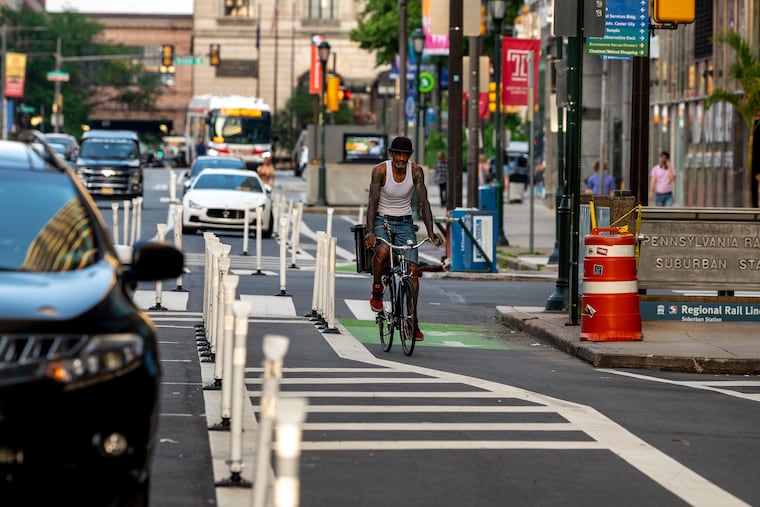You can have nice bike lanes, but only under these conditions, Harrisburg Republicans say
Municipalities could not classify some motor-vehicle offenses as "secondary" under the amendments.

In Harrisburg not long ago, House Bill 140, a technical tweak to the definition of “curb” so Pennsylvania cities could build parking-separated bike lanes without getting state permission, was just over two pages long.
Now, after amendments from Senate Republicans, the bill runs for nine pages and would tell local governments how to police traffic in their streets. It also would require appointment of a state special prosecutor to handle crimes on SEPTA.
Should it pass in this form, Philadelphia and Pittsburgh could be forced to choose between safer bike lanes and their “driving equity” laws. Those measures direct police to treat an improperly affixed license plate, expired inspection sticker, or other minor offense as “secondary” violations, meaning they can’t be used as the only justification for traffic stops, which fall disproportionally on Black motorists and can be dangerous.
“Bicycle lanes make communities safer from an infrastructure perspective [and] fewer traffic stops make communities safer from a police-community relations perspective,” said Max Weisman, spokesman for Councilmember Isaiah Thomas, who wrote Philadelphia’s traffic-stop ordinance.
“This bill creates a false choice,” Weisman said.
Legislation allowing parking-separated bike lanes enjoys support from PennDot, safety advocates, and local governments around the state that want the option as part of a strategy to make streets safer for all users. The state House approved the original bill 201-0 in March 2021.
The amendments passed on a party-line vote in the transportation committee on June 30, the last day of the fiscal year.
Over the years, Harrisburg lawmakers and Philadelphia have often wrestled over how much power the city should have to diverge from state law.
A city or township could not create such a bike lane unless it enforces all motor-vehicle violations equally, the new bill language says, prohibiting “any ordinance that creates tiered violations.” Local government also would be prohibited from directing police officers to “not enforce” any provision of the traffic code.
Stopping enforcement of minor motor-vehicle laws could make a community less safe, said State Sen. Wayne Langerholc Jr. (R., Cambria), chair of the Senate transportation committee.
“As a former prosecutor, I know that traffic stops often yield evidence of an underlying crime,” Langerholc said in an interview. He also said it’s important to have uniformity as opposed to a “patchwork” of different approaches around the state and is concerned local police could lose federal law enforcement aid.
» READ MORE: Philly has become the first big city to ban minor traffic stops said to criminalize ‘driving while Black’
Under the Senate version, the state attorney general would be required to appoint a special prosecutor to handle crimes committed on public transit in Philadelphia. It also says the prosecutor could not have worked for the Philadelphia District Attorney’s Office within six years of the passage of the legislation.
SEPTA has been beset by an increase in some crimes as well as concerns about safety from riders, employees, and Transit Police. The transportation committee held a hearing at SEPTA headquarters on public safety in May.
“There’s not any legislation addressing this. No one is standing up for the people of Philadelphia,” Langerholc said. “We could not sit idly by. If there is something we can do to help, we have a duty to do it.”
SEPTA on Monday acknowledged that it has challenges with crime.
“We are interested in any measures that would help Transit Police improve safety and security,” spokesman Andrew Busch said. “SEPTA is also supportive of the bike lane initiative, and we are hopeful that it will not be delayed as this proposal is debated.”
Separated bike lanes, considered the safest option, have historically been barred on state-owned roadways because an old Pennsylvania law requires parked vehicles to be within 12 inches of the curb, or the edge of the pavement.
The lanes, also referred to as “parking-protected,” are dedicated tracks for cyclists with a row of parked vehicles to shield them from being hit by cars and trucks. A marked 5-foot-wide lane abuts the curb and drivers park on the other side of a safety buffer — putting them up to eight feet from the curb, a violation of the Pennsylvania law.
“This kind of design can save lives,” said Scott Bricker, executive director of Bike Pittsburgh, part of the coalition working on getting a protected bike-lane law for several years. “We’re hoping there’s going to eventually be a clean bill.”
Sarah Clark Stuart, executive director of the Bicycle Coalition of Greater Philadelphia, said the issue of police traffic stops should be debated and decided separately.
“It’s a state vs. municipal control issue, a jurisdictional argument. Who’s in charge? I don’t think this is the right place. Why is it tied to this bill?”
She and other advocates say they’ll keep working. If the legislature doesn’t pass a bike-lane bill by Dec. 31, they’ll have to start all over in the next two-year session. Lawmakers are on break until the fall.
“You’ve got to have hope,” Stuart said.